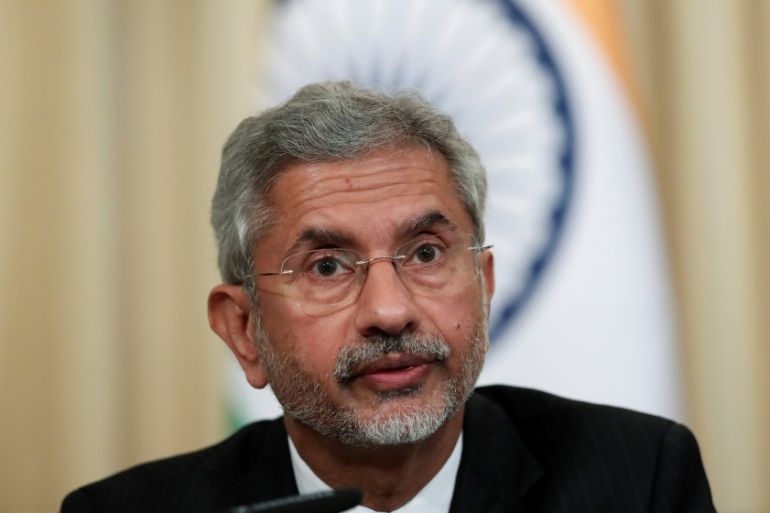India FM visits Bangladesh amid Rohingya repatriation crisis
Visit comes amid efforts to resolve the fate of 81 Rohingya refugees adrift in international waters for more than two weeks.

India’s foreign minister has arrived in Bangladesh ahead of a visit by Prime Minister Narendra Modi amid efforts to resolve the fate of 81 Rohingya refugees who are on a boat adrift in international waters.
Indian Minister of Foreign Affairs Subrahmanyam Jaishankar will hold talks with his Bangladeshi counterpart on water sharing, trade and border issues, two Indian officials in New Delhi said on Thursday.
Keep reading
list of 4 itemsThousands in India demand top judge resign over rape remarks
Bangladeshi cartoonist granted bail after widespread protests
Hundreds rally in Bangladesh over writer’s death in prison
“Of course, the Rohingya refugee issue will come up during the Indian minister’s day-long visit but the prime agenda will remain around Modi’s upcoming visit,” a senior foreign ministry official said, speaking on condition of anonymity as he was not authorised to speak to the media.
Last month, the Indian coastguard rescued 81 Rohingya, a minority who fled mostly to Bangladesh to escape violence in Buddhist-majority Myanmar, whose boat had been drifting in the Andaman Sea for over two weeks after they left Bangladesh.
Eight people on the boat had already died of dehydration.
The fate of the refugees remains unclear as India, so far, has not allowed their entry into its territory and wants Bangladesh to take them back.
But Bangladesh’s Minister of Foreign Affairs AK Abdul Momen last week told Reuters news agency his government expects India, the closest country, or Myanmar, the Rohingyas’ country of origin, to accept the 81 survivors.
Aid agencies are demanding that governments stop passing the buck and pluck the 81 survivors immediately from the Andaman sea.
India has in recent weeks provided two million doses of COVID-19 vaccines shots to Bangladesh and could use that goodwill to press Dhaka to accept the refugees.
Modi will be visiting Dhaka as part of the celebrations of the 50th anniversary of Bangladesh’s independence later this month.
More Rohingya moved to a remote island
Meanwhile, Bangladesh on Wednesday began moving nearly 4,000 more Rohingya refugees to a remote Bay of Bengal island, officials said, despite complaints from rights groups concerned about the site’s vulnerability to storms and flooding.
“Today 2,254 Rohingya people arrived and tomorrow [Thursday], we are expecting 1,700 plus,” navy official Rashed Sattar said from the island on Wednesday.
Dhaka has relocated more than 10,000 people to the island of Bhasan Char since early December from border camps where more than a million refugees live in ramshackle huts perched on hillsides.
Bangladesh says the relocation is voluntary, but some refugees from the first group spoke of being coerced.
The government has dismissed safety concerns about the island, citing the building of flood defences as well as housing for 100,000 people, hospitals and cyclone shelters.
It also says overcrowding in refugee camps fuels crime, while some Rohingya said frequent violence in the camps had driven them to relocate.
Once they arrive on Bhasan Char, the Rohingya are not allowed to leave the island, which is several hours’ journey from the southern port of Chittagong.
Bangladesh has also drawn criticism for a reluctance to consult with the UN High Commissioner for Refugees and other aid bodies over the transfers, with the UNHCR saying it has not been allowed to evaluate the safety and sustainability of life on the island.
“The process of relocating the Rohingya will continue… they are going there voluntarily for a better life,” Mohammad Shamsud Douza, a Bangladesh government official in charge of refugees, said by phone from Cox’s Bazaar in southeastern Bangladesh.
“Our main priority is repatriating them to their homeland,” he said, echoing frequent calls by Bangladesh to the Myanmar government.
A controversial process to voluntarily repatriate some of the Rohingya refugees has stalled, with a recent military coup in Myanmar reducing any hope those refugees who do want to return home may have had.
“How long will we stay here under tarpaulins?,” said a 39-year-old refugee who moved on Wednesday with his family.
“The little hope we had of returning to our homeland was shattered after the coup.”
Hundreds of thousands of Rohingya were forced to flee their homeland after a crackdown by Myanmar’s military in 2017. Myanmar denies accusations of genocide and says the army was fighting a legitimate campaign against rebels.